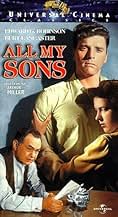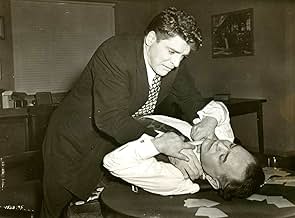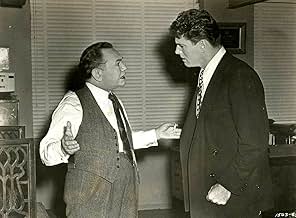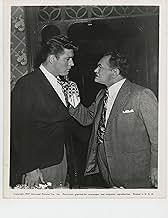IMDb RATING
7.3/10
2.6K
YOUR RATING
During WW2, industrialist Joe Keller commits a crime and frames his business partner Herbert Deever but years later his sin comes back to haunt him when Joe's son plans to marry Deever's dau... Read allDuring WW2, industrialist Joe Keller commits a crime and frames his business partner Herbert Deever but years later his sin comes back to haunt him when Joe's son plans to marry Deever's daughter.During WW2, industrialist Joe Keller commits a crime and frames his business partner Herbert Deever but years later his sin comes back to haunt him when Joe's son plans to marry Deever's daughter.
- Director
- Writers
- Stars
- Awards
- 2 wins & 2 nominations total
Harry Morgan
- Frank Lubey
- (as Henry Morgan)
Margaret Bert
- Townswoman
- (uncredited)
Walter Bonn
- Jorgenson
- (uncredited)
Helen Brown
- Mrs. Hamilton
- (uncredited)
Pat Flaherty
- Bartender
- (uncredited)
Jack Gargan
- Workman
- (uncredited)
Harry Harvey
- Judge
- (uncredited)
Jerry Hausner
- Halliday
- (uncredited)
Herbert Heywood
- McGraw
- (uncredited)
- Director
- Writers
- All cast & crew
- Production, box office & more at IMDbPro
Featured reviews
All My Sons (1948) :
Brief Review -
A terrific human guilt drama that reflects family pressure and a long-living conscience. Irving Reis's family drama is neither entertaining nor strained, but quite suspenseful. The idea of keeping the mystery unwrapped till the end was certainly new for family dramas back then, or is even today. Also, World War reference and the corporate business culture during the war period fit perfectly here. Joe Keller had been accused of murdering army officers due to a faulty shipment years ago. The court and juries acquitted him and grabbed his business partner, Herb. Now, years later, Herb's daughter and Joe's son want to get married, but Herb's son learns the truth and wants his sister to stay away from Joe and his family. The girl was previously engaged to Joe's first son, who disappeared years ago, and that's why the other son can't marry her as the mother is still hoping for that son to return home. What is the truth? Well, I guess you know it by now, or you can sense it halfway while watching the movie, but that doesn't kill the suspense at all. It eventually becomes more interesting because of its consequences. Things are predictable, but never boring. Every character offers something different. Every character has a problem of its own, and that's how they get involved with each other and then find a solution. The film has terrific speed, and the screenplay makes sure you don't get away from your sofa. The tension feels real and intriguing. Edward G. Robinson is fantastic as the man of the family, the man with the guilt, and the man with the responsibility. I couldn't have imagined him and Burt Lancaster playing father and son in the 40s, but it came out so well. Louisa Horton is another star performer, along with Mady Christians. I shall give full marks to Irving Reis for keeping me hooked and gripped for 95 minutes with the drama that I thought couldn't hold me. Reis makes sure the engagement gets an intellectual and burning ending, so don't miss it.
RATING - 7/10*
By - #samthebestest.
A terrific human guilt drama that reflects family pressure and a long-living conscience. Irving Reis's family drama is neither entertaining nor strained, but quite suspenseful. The idea of keeping the mystery unwrapped till the end was certainly new for family dramas back then, or is even today. Also, World War reference and the corporate business culture during the war period fit perfectly here. Joe Keller had been accused of murdering army officers due to a faulty shipment years ago. The court and juries acquitted him and grabbed his business partner, Herb. Now, years later, Herb's daughter and Joe's son want to get married, but Herb's son learns the truth and wants his sister to stay away from Joe and his family. The girl was previously engaged to Joe's first son, who disappeared years ago, and that's why the other son can't marry her as the mother is still hoping for that son to return home. What is the truth? Well, I guess you know it by now, or you can sense it halfway while watching the movie, but that doesn't kill the suspense at all. It eventually becomes more interesting because of its consequences. Things are predictable, but never boring. Every character offers something different. Every character has a problem of its own, and that's how they get involved with each other and then find a solution. The film has terrific speed, and the screenplay makes sure you don't get away from your sofa. The tension feels real and intriguing. Edward G. Robinson is fantastic as the man of the family, the man with the guilt, and the man with the responsibility. I couldn't have imagined him and Burt Lancaster playing father and son in the 40s, but it came out so well. Louisa Horton is another star performer, along with Mady Christians. I shall give full marks to Irving Reis for keeping me hooked and gripped for 95 minutes with the drama that I thought couldn't hold me. Reis makes sure the engagement gets an intellectual and burning ending, so don't miss it.
RATING - 7/10*
By - #samthebestest.
Although Edward G. Robinson was most famous for playing gangsters, he was a very versatile actor, playing comedies, dramas, and even period pieces. He even took on the very heavy lead in the Arthur Miller play All My Sons. Upsetting, intimate, and one you'll probably watch only once, All My Sons is worth it for the acting. Eddie G is fantastic! His long-suffering wife Mady Christians (really only remembered today as Shirley Temple's aunt in Heidi) won a Rag award for her performance. Though filmed in 1948, everyone is very realistic and subtle in their deliveries. This may be a play adaptation, but it's as much of an eavesdropped slice of life as it can possibly be.
Even starting with the opening credits, it feels like you're observing a family, not watching a movie. From the dawn of Tinseltown, credits preceded the film with music (or silence) and black and white titles. All My Sons was either the first or one of the first films to show footage behind the text instead. Immediately, you're immersed. When Burt Lancaster shares scenes with his girlfriend, Louisa Horton, you hear them whispering while in dim lighting. This is an entirely different type of drama. There aren't spotlights, strategically turned heads during important lines, and shouting to the back row.
If you like upsetting dramas, this might become a favorite of yours - especially if you're an Arthur Miller fan. Director Irving Reis got the best performances from his actors and brought what could have been a melodrama into a family's living room. It's a very good film, but it might be too heavy for the average viewer.
Even starting with the opening credits, it feels like you're observing a family, not watching a movie. From the dawn of Tinseltown, credits preceded the film with music (or silence) and black and white titles. All My Sons was either the first or one of the first films to show footage behind the text instead. Immediately, you're immersed. When Burt Lancaster shares scenes with his girlfriend, Louisa Horton, you hear them whispering while in dim lighting. This is an entirely different type of drama. There aren't spotlights, strategically turned heads during important lines, and shouting to the back row.
If you like upsetting dramas, this might become a favorite of yours - especially if you're an Arthur Miller fan. Director Irving Reis got the best performances from his actors and brought what could have been a melodrama into a family's living room. It's a very good film, but it might be too heavy for the average viewer.
The movie version of Arthur Miller's All My Sons is yet another excellent example of how a fairly dreadful play can make a watchable, even beautiful film. In its day quite relevant, the play now reeks of the stuffily leftish Old Testament pieties of the Group Theatre of the thirties, and in style, if not content, anticipates the think-piece, more mainstream television dramas of the fifties. The plot is worth going into only briefly, and concerns a morally corrupt though not innately bad manufacturer of aircraft parts whose cost-cutting was responsible for the crashing of several planes during the then recent Second World War. Set in what appears to be either a New York suburb or a leafy section of one of the city's outer boroughs, the films is beautifully photographed and designed. It isn't quite realistic, as it is obviously a studio product, but it is far less artificial-looking than most movies of the period, and is singularly evocative in every detail of a way of middle class life, leisurely and informal, egalitarian and yet conscious of social distinctions, that has long passed into history. Beautifully rendered also is the large, very comfortable house in and around which much of the film takes place. Not quite a mansion, it is nevertheless roomy and in its way elegant, of Victorian vintage or nearly so. We get to see so much of it. The dining room, with its fluffy, lacey things all about; the heavy soup bowls and plates decorated with vines and flowers; and in its somwhat retro feeling it appears, like the family itself, both vaguely European and wholesomely American. Everything in the house seems heavy and solid, nailed down, as it were, as if this way of life was going to go on forever. The scenes in the backyard show the lazy, hazy summer afternoons of lemonade and hammocks, before the arrival of television, interstate highways, and shopping malls. Overall the picture is so brilliantly and minutely detailed, whether the set is a restaurant or a factory, that it is astonishing that it didn't win the Academy Award for set design. The action, consisting mostly of people either arguing with one another, lying, or expressing strong emotions, like love and hate, is very well presented and framed within the various settings. None of the actors in the film, including a young Burt Lancaster, is at his absolute best, though Edward G. Robinson, as the paterfamilas, in snugly in his element here, and quite credible, if not moving. There's a cockiness to Robinson which, though quite charming in certain roles, works against pathos or sympathy of any kind. Thus, in the end, the film is strangely fails to tug at the heartstrings, so to speak; it worked better in the earlier scenes, before the story built a head of steam. A few behind the scenes things are worth mentioning, not the least of which director Irving Reis, whose orchestration of this and several other films of the period showed great potential. Like Robert Wise, Mark Robson, John Sturges, Edward Dmytryk and Jules Dassin, Reis was a strong up-and-comer in the Hollywood pecking order of directors of the time, and was, sadly, to die just a few years later. Mady Christians, who plays Robinson's foreign-born wife, was blacklisted shortly after the film came about. All My Sons was one of the films that was presumably going to launch its studio, the newly reorganized Universal-International, into the big leagues. It didn't, but that's another story.
Since this movie had no particular reputation, I expected a somewhat ho-hum adaptation of Arthur Miller's play. In fact, the movie somewhat improves on the play. It's not afraid to be a little more "superficial" than the play, opting less for profundity than for solid melodrama, and I do mean solid. Robinson is superb, but the real surprise for me was the unshowy, very subtle (for him) performance by Lancaster, never a favorite of mine in his latter-day, hammy period. Here he seems content to be an ensemble player, supporting Robinson and playing a relatively quiet, Gary Cooper sort of role, and therefore he comes off more of a genuine star than usual. When he does finally explode in physical violence, the effect is truly shocking.
I saw this movie today for the umpteenth time and it finally occurred to me... Weren't both men to blame? Wasn't Herbert Deever really just as guilty as Joe Keller? No matter who "says" they are responsible, anyone involved in knowingly shipping faulty parts that could kill people is responsible. Deever shouldn't have sent them out, no matter what he was told. Isn't that what all those Nazis claimed when asked how they could commit so many atrocities? "I was just taking orders." That doesn't wash with me or with most people. We all have a responsibility to follow our own consciences with regard to right and wrong.
They were both guilty....
It's a wonderful story and very well performed and written, but that fact remains to be discussed.
They were both guilty....
It's a wonderful story and very well performed and written, but that fact remains to be discussed.
Did you know
- TriviaThe original Broadway production of "All My Sons" opened at the Coronet Theater in New York on January 29, 1947. It ran for 328 performances, and won the 1947 Best Play Tony Award for author Arthur Miller. His original script was used as the basis for this movie's screenplay.
- GoofsWhen Joe comes out of the house upon Annie's arrival, he comes down the front steps and walks into the yard with his arms raised. In the next instant, he's back at the steps and his arms are down.
- Quotes
Jim Bayliss: Put her to bed, Joe. Both of you go to bed. Staying up won't help; sleep will. Sleep's a wonderful thing, the best thing about living.
- ConnectionsFeatured in Film Preview: Episode #1.1 (1966)
- How long is All My Sons?Powered by Alexa
Details
- Release date
- Country of origin
- Official sites
- Language
- Also known as
- Svi moji sinovi
- Filming locations
- Santa Rosa, California, USA(the Grace home on McDonald Avenue)
- Production company
- See more company credits at IMDbPro
- Runtime
- 1h 34m(94 min)
- Color
- Aspect ratio
- 1.37 : 1
Contribute to this page
Suggest an edit or add missing content




































